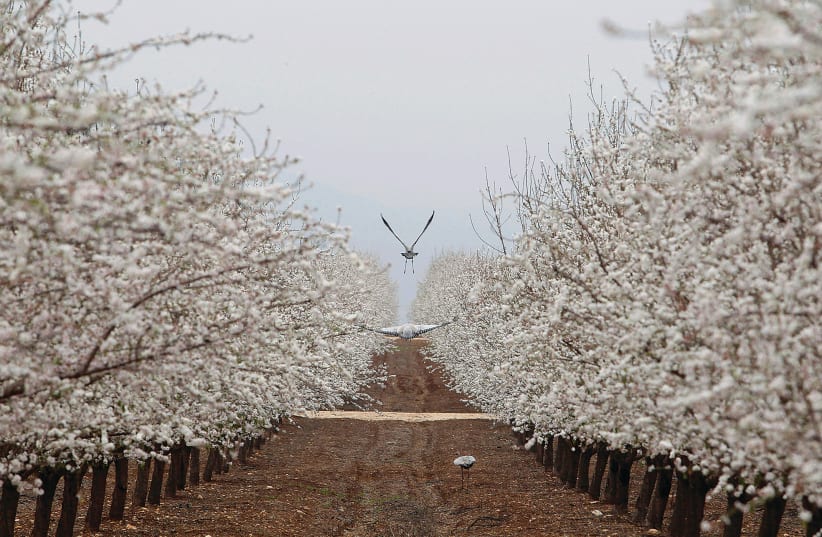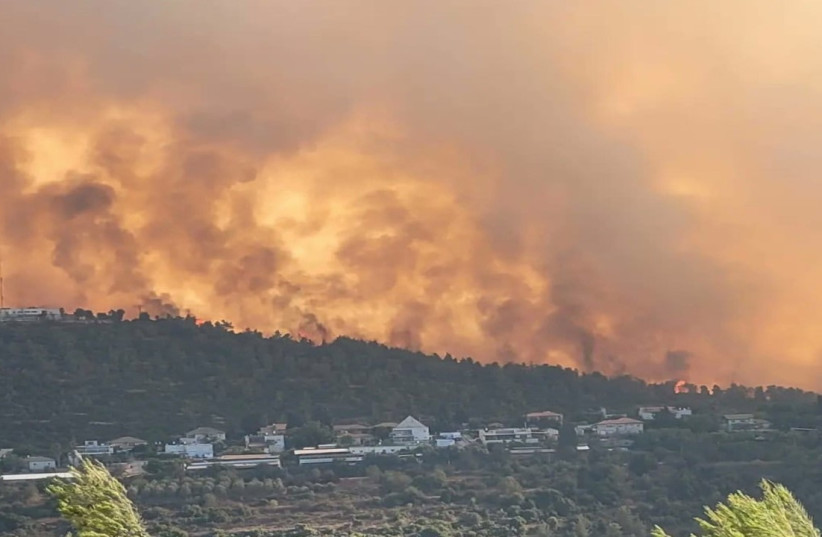‘Our forebears knew how to thank the trees,” assumed Arye Zuta (1868-1939), who effectively invented Tu Bishvat, our Holiday of the Trees, whose celebration next Monday will be marred by nature’s resurging attack on mankind.
A Hebrew teacher who arrived in Ottoman Palestine inspired by the Russian version of Arbor Day, Zuta persuaded the Hebrew Teachers Union to hold a big planting event on the 15th of Shvat, which Jewish law marks as the New Year of the Trees.
Zuta’s assumption that our forebears celebrated nature was unfounded – the date merely marked the beginning of the tithes’ year – but his initiative was a huge success.
What began in 1907 with 300 children from five schools became 1,500 students by 1913, and the holiday took root (Hizky Shoham, “From the Town – and from the Village? The Creation of Planting Ceremonies on Tu Bishvat,” Israel 22, 2014).
Every school and kindergarten held mass plantings, families held festive meals of fruits and nuts, and Tu Bishvat became a fixture of the Zionist enterprise, like Hebrew’s revival and the emergence of Tel Aviv.
Tree planting became so massive that Israel is the only land that emerged from the 20th century with more trees than it had when it began.
Even so, as Israel matured, people began asking what, actually, they were celebrating on this strange holiday, which unlike Purim and Hanukkah has no constitutional text like the Book of Esther and the Books of the Maccabees, and unlike Independence Day and Lag Ba’omer is not a vacation day.
That is how what originally served Zion’s reclamation and Jewish farming’s restoration assumed a new, universal relevance as the holiday of nature.
FEAR OF man’s damage to nature began with the Great Smog of 1952, when coal emissions covered London with a thick, choking cloud for four days. The consequent Clean Air Act reflected anxiety and guilt over man’s ruination of nature.
Unlike what some would have you think, there was nothing conspiratorial about this. The industrial revolution and nuclear age really threatened the planet’s flora, fauna, surface and air.
The new Tu Bishvat became part of this Zeitgeist. The Jewish National Fund, for instance, grafted its planting drive with the United Nations’ “Plant the Planet” effort to dot the world with a billion new trees. The Israel Nature and Parks Authority and the Society for the Protection of Nature in Israel now use Tu Bishvat to promote assorted environmental struggles.
The common denominator among these is the fear of modernity’s affront to nature, in the spirit of the sages’ story that after God created Adam, and after he showed him Eden’s trees and also told him “look at My creations, how handsome and refined they are,” God commanded Adam: “Make sure not to ruin and destroy My world, because if you do ruin it, no one will be there to fix it” (Kohelet Raba 7:13).
Yes, modern man ignored this order. Civilization came to threaten nature, and undoing this threat is possibly modern humanity’s major task, a task American essayist Henry David Thoreau defined already in 1862 when he wrote that “in wildness is the preservation of the world.”
Even so, violence between humanity and nature is a two-way street, and right now it is humanity that is on the defensive, and nature is on the attack.
THAT NATURE storms people is a no-brainer. Floods, earthquakes, droughts, avalanches, volcanoes, hurricanes, tornadoes and tsunamis attack humans habitually, often destroying entire families. Yes, the quest to protect nature is noble, and in recent generations has also become existential, but the fact is that nature and civilization are not born allies, and man’s damage to nature is only one side of the story.
Having said this, nature’s attacks are ordinarily local. A volcano can erase a village, an earthquake can strike a city, a tsunami can drown an extended coastline and a tornado can cross mountains and prairies, but such calamities never target simultaneously the entire human race.
The pandemic does.
The coronavirus has plagued millions in all continents while shuttering kindergartens, schools, universities, malls and airports worldwide. In terms of its scope, it is an attack nature has never previously achieved.
Yes, some will argue that the pandemic is not nature’s fault, but civilization’s. Hairsplitters will say the Black Plague was transmitted via the Silk Road’s caravans and the Black Sea’s merchant boats, and the current plague would not have gripped mankind without our globalized era’s intensified air travel.
That’s nonsense. Most plagues, including this one, are the result of human contact with wildlife, and are thus nature’s attack on mankind. The bad news, then, is that we are at war. The good news is that we will win.
In its first two years, nature’s attack killed some 5.5 million people. That’s terrible, but it is less than one fifth of the Spanish flu’s harvest during its own first two years, not to mention the Black Death, which is believed to have killed at least 75 million people.
In other words, nature’s current attack, from its own viewpoint, is failing. And nature is losing because of civilization’s science, industry, education, commerce and transportation, which provided the vaccines, medications, doctors and nurses that will decide this war.
So will we celebrate nature this Monday? Of course we will. Like the Psalmist, we will praise nature’s “rising mountains,” its “sinking valleys,” its “wild beasts” and “the birds of the sky” that “sing among the foliage” (Psalms 104).
However, that poet also conceded that nature’s beauty included the “darkness” that makes “the beasts of the forest stir,” and “the lions roar for prey.” Yes, beasts, viruses and their predatory ways are also part of nature, and man’s task when encountering them is not to wax poetic about nature and its beauty, but to hand it defeat.
The writer’s best-selling Mitz’ad Ha’ivelet Hayehudi (The Jewish March of Folly, Yediot Sfarim, 2019) is a revisionist history of the Jewish people’s leadership from antiquity to modernity.

